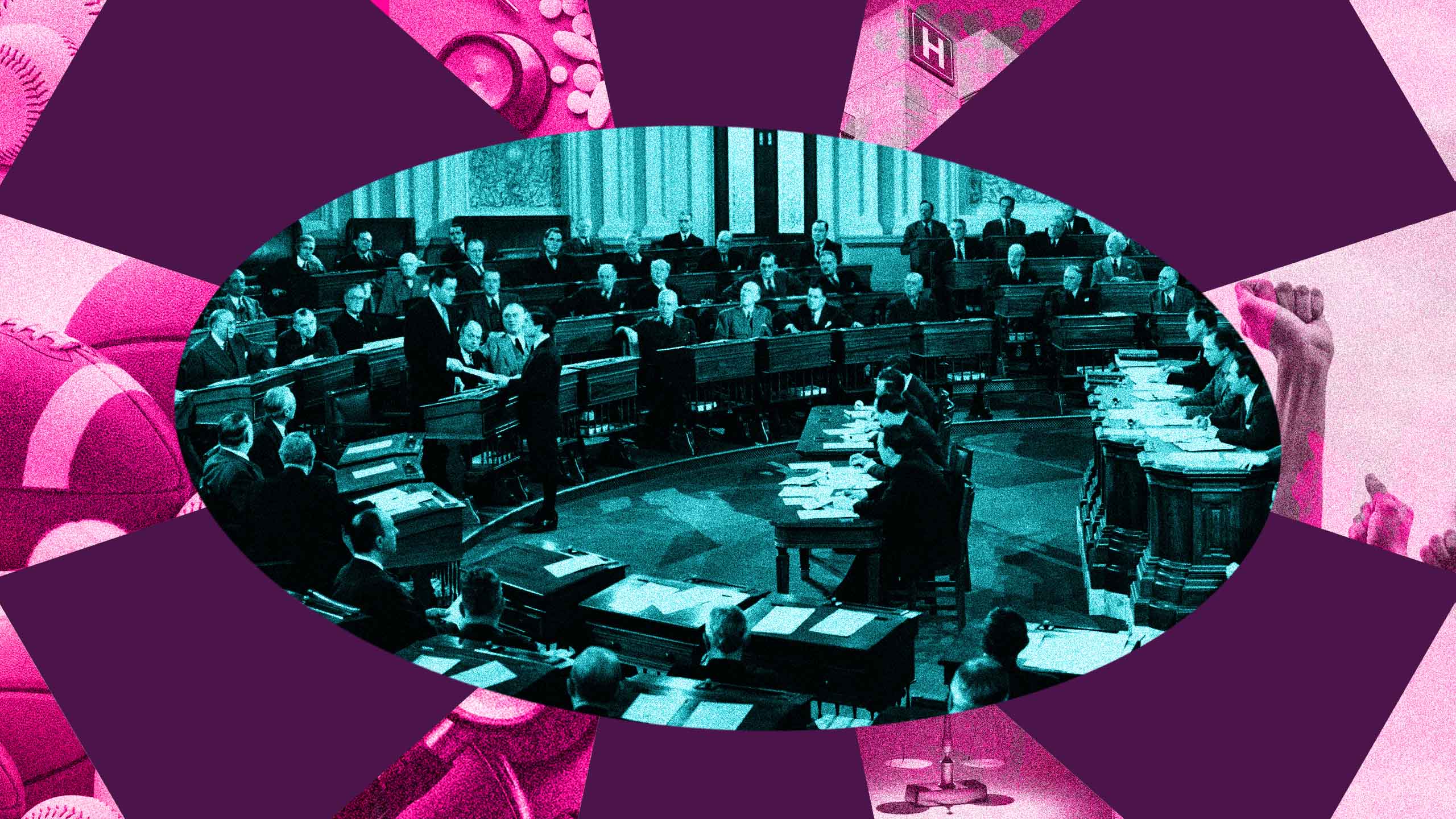It’s the start of the new year and that means it’s state legislative season, when politicians can start filing new proposed bills again. It’s also the time of year when conservatives start floating their most bigoted fever dreams for wiping queer and trans people out of society.
Already this month, over 300 anti-LGBTQ2S+ bills have been introduced at the state level. Ohio has already passed one of the worst bills we’re likely to see this year, a combination ban on trans girls in girls’ sports and a ban on gender-affirming care for trans youth.
While some of this proposed legislation clearly poses a threat, we should resist the urge to panic over every new bill that gets dropped over the next few months.
A bunch of bills filed in red state legislatures have little to no hope of moving forward. A Republican in Oklahoma filed a bill that would serve as a de facto ban on all gender-affirming care, even for trans adults, for example. The same legislator proposed the same bill last year and it went nowhere.
In Indiana, queer people were sent into a brief panic when a bill proposing to end legal recognition of trans people and also to nullify and ban gay marriage in the state went viral online. The bill has a snowball’s chance in hell at passing because no legislative body in their right mind is going to outlaw gay marriage in 2024—even if they did, it would have little chance of success in the court system. But these barriers didn’t seem to get translated in the online panic over the bill’s introduction.
While it’s important to watch for new bills at the state level because we have to keep apprised of any potential long-term threats to our livelihoods, it’s equally important to account for a given bill’s likelihood of passing.
The political importance of the bill introduction phase of the state legislative season is often difficult to parse. On the one hand, every bill that eventually becomes law has to be introduced first. But on the other, most bills that are introduced will never become law.
This period gives legislators a chance to tell voters about the policies they would like to implement that normally would never have enough support to pass. These are called messaging bills, and they’re quite common.
There’s nothing in the process stopping some random state representative from introducing a bill proposing to put all trans people in a given state in a re-education camp, for example. The only limits are how much that representative’s district voters or the federal judges ruling in the future are willing to tolerate.
It’s no secret that transphobia has been a central animating issue for conservatives for the last seven years, and their obsession with us and our bodies has especially intensified over the last three.
But there’s been some questioning of late of just how effective anti-trans legislation is in winning elections. In statewide elections, like for governor or for U.S. Senate, many vehement transphobes have seen their electoral careers blown up after pushing hard at persecuting trans people. We’ve seen similar outcomes in local school board races. Nonetheless, we’ve yet to see anti-trans state legislators punished at the ballot box for their transphobia.
This is likely because most red states are extremely gerrymandered, with legislators themselves drawing their own district boundaries, effectively choosing their own voters. That gerrymandering drives legislators to be more and more extreme over time as they redraw districts to cement their voter advantage.
Leaning in to transphobia has helped some conservative media figures build their profiles on Fox News, or the Daily Wire. Introducing a new level of anti-trans bill remains the easiest way to garner media attention for some of these small-town red state lawmakers.
“If we jump to fight every bill that gets introduced, our activists will eventually burn out.”
Despite these threats, we must, as I’ve said before, use caution in what we give attention to. We should be aware of what our political enemies are doing with regard to legislation, but we don’t need to start a panic over every new bill that’s dropped.
There’s danger in over-panicking about proposed legislation. We have precious few resources for fighting back in a lot of these states, and money can sometimes follow attention. If we jump to fight every bill that gets introduced, rather than the ones that have a realistic chance of passing, our activists will eventually burn out, and our money resources will be stretched thin. Not only that, we risk coming off as crying wolf in the eyes of a largely politically unaware general population.
The trans community is particularly prone to suicidality, and spreading a sense of political hopelessness may aggravate that. It may also drive trans people to overreact and unnecessarily leave their homes and support systems, which can present a whole new set of problems.
Some on the left are often fond of telling trans people in red states like Florida to flee the state, but are curiously silent when asked what trans people who can’t flee the state are supposed to do.
Indiana isn’t going to ban gay marriage any time soon: that would require a Supreme Court ruling. Oklahoma is highly unlikely to ban gender-affirming care for trans adults imminently: the very same bill was introduced and went nowhere last year and there’s little indication that legislators will go there now, especially in an election year. These are just signal bills, a form of vice signalling, meaning to signal a bigotry to voters, for conservative legislators and their conservative voter bases.
I suggest we wait to see how bills develop in the law-making process before we start panicking. That doesn’t mean we should ignore these bills, or fail to organize against them. We just need to be realistic about the threat level of each given bill.
As queer journalists, our readers look to us as voices of fact and reason. Yes, more anti-trans bills were introduced into law last year than ever before, but technically, more anti-trans bills than ever before also failed to get passed into law than ever before as well.
We should be mindful of that the next time you hear about whatever it is that Arkansas or other red state wants to do to LGBTQ2S+ people. Panicking is never the answer when we hear about new legislation. The filing period is just the opening phase of the legal battle and we must respond with effort and organizing; fear and panic get in the way of the process of fighting back.


 Why you can trust Xtra
Why you can trust Xtra


